September 8, 2015
BURLINGTON, ON
Once the “love in” part of the evening was over – those in the room at the Royal Botanical Gardens were able to take part in a good discussion on what the province was planning on doing about transit in the province.
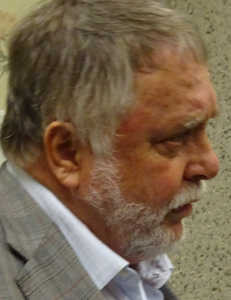
Minister of Housing and Municipal Affairs is in the thick of transit issues as well – Ted McMeekin takes part in Town Hall on Transit
Burlington MPP Eleanor McMahon and Minister of Housing and Municipal Affairs MPP Ted McMeekin hosted the event at which Minister of Transportation Steve Del Luca did most of the talking and the listening.
The stopover in Burlington was the fourth Town Hall type meeting Del Luca has held – 40-50 people in the room – close to a quarter of them bureaucrats of one flavour or another.
He told the audience that his mandate was to “catch up” and “keep up” on transit matters. While highways are a large part of that mandate – this meeting was about transit.
Difficult for a Burlington audience not to want to drift into highways when the QEW and the 403 cut us into pieces.
Del Luca pointed out that the government has committed $130 billion over ten years into getting a transit system that meets the needs – it’s amazing how these people throw around those big number – billions – millions.
An additional $31.5 million has been has been added to put a 15 minute – both ways service in place on the Lakeshore, Kitchener, Stouffville and Barrie services.
De Luca made a strong point when he explained the situation on the Barrie line: four trains leaving Barrie every morning and four leaving Union Station for the trip home each evening.
Which was Ok for people who just commute and stay in the city all day but for those who want to slip into the city for an early afternoon meeting and then head back to an office in Barrie the current service doesn’t work – those people explained Del Luca drive in and out – adding to traffic congestion and wasting a lot of time behind the wheel of a car.
The Transportation Minister added that getting 15 minute service has some hurdles to be gotten over – and the electrification of the system has its own problems.
Track ownership is also a problem – but Del Luca was able to leave the impression that he has a strong team and that they can learn to understand the problems and then find solutions.
What was refreshing was that Del Luca didn’t even try to sugar coat the problem.
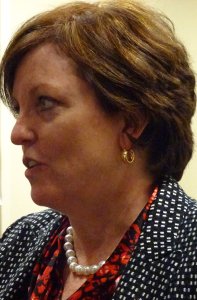
Burlington MPP Eleanor McMahon hosts a Town Hall on Transit and lets the Ministers do all the talking.
He made it clear that he wants to see the changes made within a decade and that to make it happen there has to be a change in the culture – the car isn’t going to be what it has been – both in the way it is used and in the way it is designed for the future.
The rail lines are going to be electrified – if we don’t do that greenhouse gasses will kill us all.
Everyone wants better service but the changes we need to make to provide that service will be disruptive – which boots the ball into the political realm. Del Luca’s trip to Burlington was to get a sense of what the public in this part of the world was thinking.
Something not usually seen at Burlington based event s was the participation of students from McMaster. All males and all appeared to be graduate level students – and they had good questions.
Del Luca, who represents Vaughan in the Legislature, pointed out that his mandate is focused on capital projects – this guy is building a transit system – all the bells and whistles on what happens when the transit system is in place is the responsibility of the municipalities that connect with those rail lines.
The only thing the Ministry does, explained Del Luca, is give the municipalities a portion of the gas tax it collects. Burlington got between $20 and $21 million last year.
There are Buringtonians who come close to swallowing their tongues when they see some of that tax rebate being put into infrastructure (roads) upgrades and upkeep.
The cultural change the Minister is working to bring about hasn’t penetrated as deeply as it is going to have to in Burlington – the city may be one of the last to fully understand what has to be done.
There were people from Burlington transit and transportation in the room – but they didn’t seem to be paying a lot of attention from where I was sitting.
There was a little bit of money for new ideas and pilot projects explained Del Luca. “We put $1 million into a fund for new ideas and doled it out in $100,000 grants. It was so popular and useful that we increased the annual allotment to $2 million.”
Milton got a grant to create an application that would let commuters use their smart phones to tap into their transit schedule – there was no mention of any application from Burlington Transit.
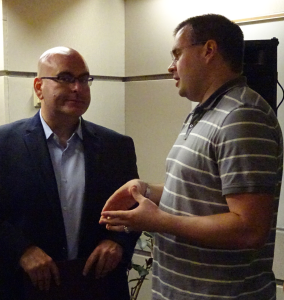
Minister of Transportation for the province Steve Del Luca engages Greg Woodruff on the role of the car in future transit plans – both agree the car isn’t going away.
Aldershot activist Greg Woodruff engaged the Minister on the role cars would play in transportation. He pointed out that the car is undergoing a very radical change and added that research suggests there will be 40% fewer cars on the road within the decade – what does that do to your transit plans he asked.
Del Luca told Woodruff he didn’t think he was wrong and added that within the decade 70% of the cars on the rod will be automated. Both men agreed that the car was not going to go away and it doesn’t need to go away – it will just play a much different role and will not dominate the way it has for the past number of decades
While transit was the focus of the meeting – land planning policies that make sense was a critical clutch point – and the sense in the room seemed to be that we weren’t doing all that well on developing those policies.
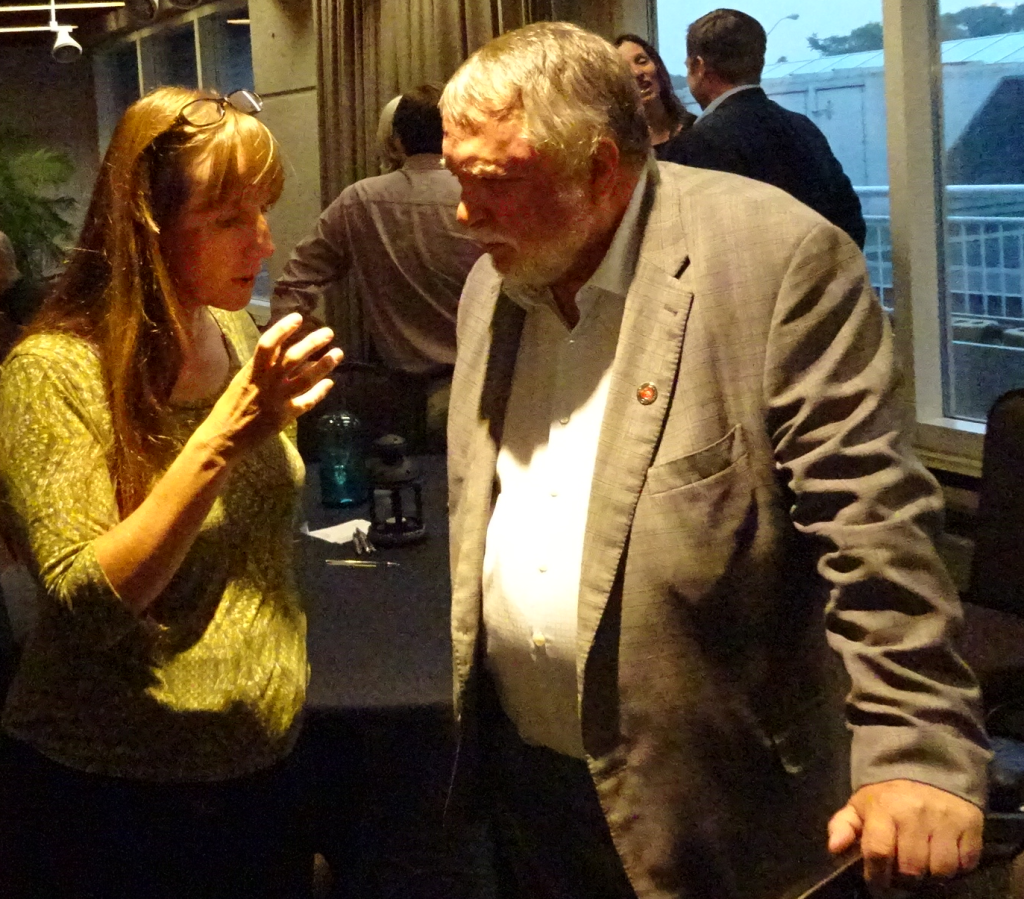
Ted McMeekin, a political activist who got into government to make changes talks with Rishia Burke, a staffer with Community Development Halton – an organization McMeekin got started with others many years ago. One could almost see the torch being passed.
Minister McMeekin, who wasn’t saying all that much, explained that he was coordinating a review of the urban sprawl we have to work with and what part urban boundaries play in transit planning.
There are transit advocates in Burlington who wonder why the Oakville, Milton, Burlington and eventually Halton Hills transit services are not rolled into a single service – York Region has done that very successfully.
At some point there is going to be transit service along Dundas and rolling up into Milton – whose court will that ball be in – Milton or Burlington?
Creating a smoother transition for transit users in the east end of the city who want to or have to use both Oakville and Burlington transit is another problem
When Burlington’s politicians got all hairy about transit and began taking the bus to work, and making sure there was a photo op to prove they had actually ridden the bus, ward 2 councillor Marianne Meed Ward took the bus to a Regional meeting – that isn’t something she will be doing again.
It has become clear to the government that in order for transit use to be increased – growth and intensification has to be along transit lines.
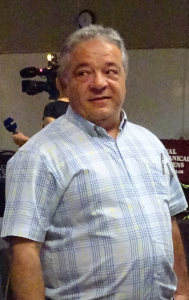
Vito Tolone, interim director of transportation for Burlington, did a lot of listening as the two provincial minsters did all the talking. Their comments seemed to tie into the Draft Transportation Master Plan Tolone is working on
Where are the transit corridors going to be in Burlington. Vito Tolone, interim Director of Transportation, is working on a Transportation Master Plan – a draft was put together by people from both planning and transportation. While far from complete – there were some pretty solid suggestions as to the direction the city could consider taking.
Unfortunately there wasn’t much in the way of enthusiasm in the response from city council on what was a well presented set of suggestions and ideas – whatever Burlington does – transit is going to have to be the core – and this city council just doesn’t have much of an appetite for more busses on the streets – all they can see is empty busses going by.
Minister Del Luca asked the municipalities to “work with us and get it right” He wants to do away with the artificial transit barriers and the artificial municipal barriers to get it right.
It is not going to be easy to do that with the city council Burlington has today.
The last topic to get some time was the HOT lanes that were put in place for the Pan Am Games. It may not be popular, but High Occupancy Toll lanes are becoming the flavour of the month in transit and transportation circles.
Ontario transportation officials are fine-tuning a plan to introduce the concept to selected highways in the Greater Toronto Area. Most Ontarians are familiar with HOV (or High Occupancy Vehicle) lanes that require a vehicle to have at least one passenger.
The HOT lane expands upon that, extending access to lone motorists — but charging them a toll. The government is moving ahead on installing high occupancy toll lanes. These are on the way but “we want to make sure we get it right,” he told the media.
At the Burlington event Del Luca said the move wasn’t intended to produce revenue but to free up capacity – the thinking being that if someone was prepared to pay a fee to drive in a HOT lane that meant their car would not be taking up space in the free lanes.
Del Luca told the Burlington meeting that the government had not clearly communicated what the program was, how it would work and the difference it would make.
He certainly got that part right. Many wonder just what the cost would be – and how much would be spent on creating the things – whenever government and technologically are in the same room – the costs just seem to rise – remember the mess and the expense with making hospital records electronic – gazillions – and it isn’t done yet.

















Has anyone talked to the Motor Vehicle Manufacturers Association about there being 40% fewer cars on the road in the next decade?
And what does this mean for employment in that Ontario key industry?
And who really thinks that in the next decade 70% of cars will be automated?
A recent story on the Google car indicates that their automated cars are too safe to function effectively in a mass application. Humans have a fuzzy logic to their detailed driving habits, for example running stops, it said.
How one would ever solve this fuzzy logic problem for mixing millions of cars in modern and complex road systems? Only a human brain can do this.
Anyways, this whole train of thought just boggled my mind with its glaring failure to account for the reality we are living.
Hello? what are these people thinking, and one is the Minister of Transportation? Are these people even conscious?